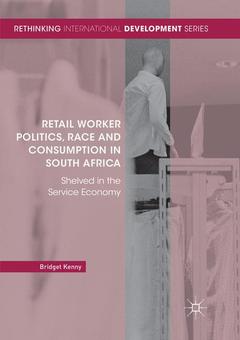Retail Worker Politics, Race and Consumption in South Africa, Softcover reprint of the original 1st ed. 2018 Shelved in the Service Economy Rethinking International Development Series
Auteur : Kenny Bridget

This book argues that we need to focus attention on the ways that workers themselves have invested subjectively in what it means to be a worker. By doing so, we gain an explanation that moves us beyond the economic decisions made by actors, the institutional constraints faced by trade unions, or the power of the state to interpellate subjects. These more common explanations make workers and their politics visible only as a symptom of external conditions, a response to deregulated markets or a product of state recognition. Instead ? through a history of retailing as a site of nation and belonging, changing legal regimes, and articulations of race, class and gender in the constitution of political subjects from the 1930s to present-day Wal-Mart ? this book presents the experiences and subjectivities of workers themselves to show that the collective political subject ?workers? (abasebenzi) is both a durable and malleable political category. From white to black women?s labour, the forms of precariousness have changed within retailing in South Africa. Workers? struggles in different times have in turn resolved some dilemmas and by other turn generated new categories and conditions of precariousness, all the while explaining enduring attachments to labour politics.
Chapter 1. Introduction: Precarity in Store.- Chapter 2. Servicing a Nation: White Women Shop Assistants and the Fantasy of Belonging.- Chapter 3. Rupturing Relations: Abasebenzi as Collective Political Subject.- Chapter 4. Regulating Retail: The Category “Employee” and its Divisions.- Chapter 5. Signifying Belonging: Restructuring and Workplace Relations.- Chapter 6. “Tools Down, Everybody out to the Canteen!”: Wildcats and Go-slows, Political Subjects Reconfigured.- Chapter 7. “To Sit at Home and Do Nothing”: Gender and the Constitutive Meaning of Work.- Chapter 8. Consuming Politics: Wal-Mart, the New Terrain of Belonging and the Endurance of Abasebenzi.
Bridget Kenny is Associate Professor of Sociology at the University of the Witwatersrand, South Africa. She works on labour, gender and consumption with a specific focus on service work, precarious employment, and political subjectivity.
Date de parution : 01-2019
Ouvrage de 282 p.
14.8x21 cm
Date de parution : 06-2018
Ouvrage de 282 p.
14.8x21 cm


